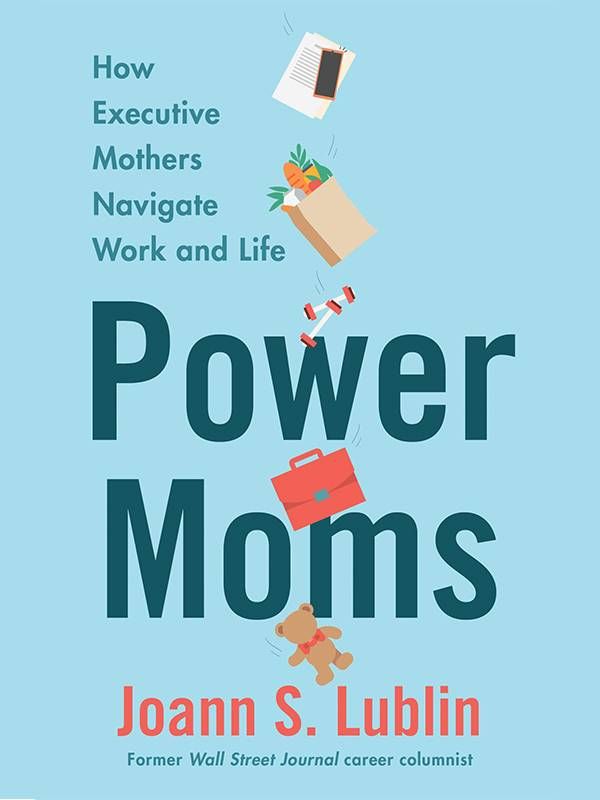Executive Moms: How Things Have Gotten Better and Worse
'Power Moms' author Joann Lublin on experiences of boomers, Gen Xers and millennials
In the 1980s, while in her late 30s, Wall Street Journal reporter Joann Lublin became one of two women running the paper's London bureau and stepped into management. Her four-year-old daughter Abra, Lublin writes in her new book "Power Moms: How Executive Mothers Navigate Work and Life," was "not thrilled."

As Lublin headed to a plane to England to arrange for child care, schools and housing, Abra screamed hysterically: "Mommy, don't go! Mommy, don't go!" Lublin was filled with guilt — "a guilt that many working mothers know well," she writes.
They still often do, based on the reporting the longtime Wall Street Journal career columnist did for her new book. But, as Lublin told me when I interviewed her, life for today's Power Moms has improved in a number of ways — partly due to something millennial Power Moms call "sway." (More about that, and my Zoom interview with her, shortly.)
"The boomer moms did not feel comfortable for the most part about broadcasting their parental status."
Lublin, who's based in Dresher, Pa., interviewed 86 women — members of the first wave of boomer Power Moms like herself — and Gen Xers and millennials in the second wave today. The author of the earlier book "Earning It: Hard-Won Lessons From Trailblazing Women at the Top of The Business World" also spoke for this one with 25 adult daughters of boomer executive moms to learn what life was like growing up with them (spoiler alert: not always great) and how the experience has shaped their own careers.
Richard Eisenberg: Do you feel that you sacrificed anything, either being a mother or being in management, because you were a working mom in the 1980s?
Joann Lublin: There wasn't a lot of room for asking to be treated differently when there weren't role models. This is one of the biggest differences that I saw between these two generations.
These Gen X and millennial moms who are moving into executive roles can see that it's been done before. And they have not only older women who have had kids and became successful executives who can be role models. They [the boomer Power Moms] can be their sponsors; they can vouch for their abilities and their capabilities of combining motherhood and executive careers.
How would you describe the attitude of top management in corporations toward Power Moms in the 1980s?
I don't think they thought about it at all, because this became sort of the world's best kept secret. The boomer moms did not feel comfortable, for the most part, about broadcasting their parental status, because it would take away from their legitimacy and ability to exercise clout in their professional roles.
Because it wasn't seen as something that was socially acceptable. And it was also seen as something else that was taking away their focus and their concentration on being successful at work.
Now, how much of that was in the women's heads, as opposed to the corporate culture that existed? Probably some of both. But I think it was much more the latter because of the basic unconscious bias and gender stereotypes.
In the book, there's one example of this boomer Power Mom who came back to work, with no maternity leave, literally days after the birth of her child, because she was an executive in a real estate company. And she was the only female at that level. She had to bring a special pillow to sit on, because she was still sore from the delivery.
And there's a certain amount of literary irony to that story. Her adult daughter has now moved back home with her single mom, but rarely gets home in time to have dinner with her weeknights, just like her mom rarely got home when she was growing up.
The Cat's in the Cradle.
The Cat's in the Cradle. Absolutely.
And how would you describe the attitude of top management in America today towards the second wave of power moms?
I think we're light years different and I think that's why we're seeing more women becoming senior executives and, I believe, we're at a record number of female CEOs of Fortune 500 companies.
It's much more socially acceptable for women to have high-powered careers and to have families. It's also frankly much more socially acceptable for men to be hands-on parents.
"The boomer moms feel very sorry for the Gen Xer and millennial moms who have to be 'always on.'"
And so, if we didn't have a shift in attitude on the employer front, combined with the shift in attitude among the men, then it wouldn't be possible for so many of these younger women to be as successful as they are.
The issue we still have is unconscious bias. Men are still reluctant — even if there are generous family-friendly benefits, if there's paid parental leave irrespective of gender — to take advantage of what is being offered to them, because they're not sure how they'll be perceived.
And did you find the Power Moms today feel that they're being watched because they're moms or that they have to work differently because of that? Or do they just see it as just part of their life and no big deal?
There's a much, much greater sense that they don't have to prove themselves. Some of them say, 'we've earned it.' So, they don't have to justify their existence. And they join up or form support groups for working parents in their workplace if things are not totally the way they ought to be.
The young women are getting the advantage of having paid it forward by the boomer moms. But they, in turn, are paying it forward for the women who are younger than them.
You wrote that you expected life to be much easier for the second wave Power Moms. Is it?

Yes, because of more supportive employers and more supportive spouses. But one reason why it is easier is also why it's also harder: advances in technology.
When you had dial-up [modems], you weren't able to do a lot of work from home, so you just stayed late at the office when you were a boomer mom in a management role. Now it's very possible to work from home. But as millions of parents have discovered during the pandemic, even though it also means huge amounts of interruptions, those advances in technology have a downside to them, which is that you can be always on.
And I think that has been aggravated during the pandemic. When you can be reachable twenty-four/seven, many people feel like they have to be. And the boomer moms feel very sorry for the Gen Xer and millennial moms who have to be 'always on.'
Other than technology, do you see anything that's worse for today's Power Moms than for the first wave?
I think another thing that's worse is this ethos of what the Atlantic magazine calls 'workism.' That is, we worship at the altar of work being the be all/end all of our existence. And that, I think, is much truer today than it was when the boomers were moving into executive roles.
I'm a little surprised to hear you say that because I think a lot of millennials have a better view of balancing work and life.
It's the bosses who want that [workism]. And I think the millennials and Gen Xers are definitely pushing back. They prefer to work for employers that recognize that people have personal lives.
And frankly, they can vote with their feet [switch jobs] to a degree that the boomer moms didn't feel they had the freedom to do. If there are relatively few workplaces that have family-friendly attitudes and benefits, then you're not going to be able to jump ship at a moment's notice. Whereas today, there are plenty of options, including starting your own business.
A number of the Gen Xers and millennial moms I interviewed worked for bigger companies and then decided they wanted to have their own company. Lo and behold, when they were the CEO, then they got to essentially set the ground rules for what the corporate culture would be like.
Jen Hyman is a really great example. She's the [40-year-old] CEO and co-founder of Rent the Runway. When she co-founded the company, the family-friendly benefits were only available for salaried employees. She extended it to the hourly people as well.
She also made it clear that the role models have to start at the top. So, when it was obvious that very few of the male employees were taking their twelve weeks of paid parental leave when they became fathers, she insisted that her direct reports do so and essentially become the role model. So, her chief technology officer took all twelve weeks of his paid parental leave in 2017. And when I interviewed her, she said every single new dad since then had done so as well. So, the tone of the top matters.
You talk in the book about what you call the new concept of 'work/life sway.' And you say it's a sharp distinction between today's executive mothers and previous generations. Can you talk about that?

I had never heard the term myself until I did my first interview with one of the younger wave executive moms. But I did know from writing 'Earning It' that this notion of work/life balance was an impossible ideal.
The concept of work/life sway is that we can never be perfectly balanced. We have to accept that life is a flow, and that at times we have to be a hundred and ten percent present for work. And at other times, we have to be a hundred and ten percent present for our family. And we have to be ready, willing and able to go back and forth at the drop of a hat as needs, demands and situations require and change.
What surprised you the most when you were interviewing the boomer women who were Power Moms?
I think what surprised me the most was why they were so passive about accepting the status quo when it came to looking for help from their husbands.
That was not universally true. But for the most part, it was: 'Of course, I would not ask my husband to pick up Johnny if he gets sick at school and bring him home, because he wouldn't do it.' Or the boomer mom who had a job where she worked evenings at a cable TV station and during her dinner break would rush home to make dinner for her stockbroker husband. It would never occur to her to suggest that he make dinner, because that's what wives did.
And what would you say was the biggest surprise when you talked to the Gen X and millennial moms?
While they still felt working-mother guilt, it took many different forms. And it wasn't, frankly, as harsh. There were boomer moms who could still recount how terrible they felt about being out of town on a business trip on the day of Sally's eleventh birthday, even though she was home for the birthday party on the weekend. And when I interviewed the adult daughter, she said: 'I had no recollection of mom being out of town on the day of my birthday, because mom was there for the party and mom baked the cake.'
And so the younger moms just aren't willing to accept working-mother guilt as a given; they don't see that as their 'lot in life.' And I was, I was glad to see that.
Let's talk some more about the daughters of the boomer Power Moms. What did they tell you?
A lot of them had adolescent clashes with their moms, which is true, irrespective of whether mom is working outside the home or not. But I think that what is different here is they had mothers who were larger than life. And who, in some cases, the daughters felt, Number One, they could never fill her shoes. And Number Two, maybe they didn't want to, because they felt badly about how hard mom was working and how stressed out she was.
And they also saw that it took its toll on her health. There was one daughter whose mom had not one, but two, strokes when the mom was in her forties.
But at the same time, these power moms ended up becoming hugely helpful, informal career coaches as these daughters entered the workforce. And some of the daughters described their moms as their secret weapon, and lent her out to friends of theirs, for feedback on critiquing a resumé or whatever. And so, that was really great.
But I think up until that point, they often had moms who would influence, or try to influence, where they went to college, what they majored in, what their professional pursuits were. And kids generally don't like to be told what to do. And more so, if mom's a super successful executive.
You interviewed some women of color for the book and I'm wondering if there were any differences you found between what you heard from them compared with women who were white. And I'm talking about the boomer power moms, the Gen Xers or the millennials.
There were a significant number of women of color in the book, almost twenty percent. And partly that is a reflection of changing attitudes and acceptance in corporate America of women of color moving into positions of power. And so, the vast majority of those women of color were among the Gen Xers and millennials as to whether their race interfered with their advancement.
It wasn't an issue I asked them, but it definitely was an issue between the mothers and the daughters in some cases. I do remember in one case where the Black executive who was a boomer Power Mom being criticized by her adult daughter for essentially talking 'white' when she was with her white colleagues.
How far do you think we have come for Power Moms, and how far do you think we have to go?
I think we have come light years, but we have a few more light years to go.


